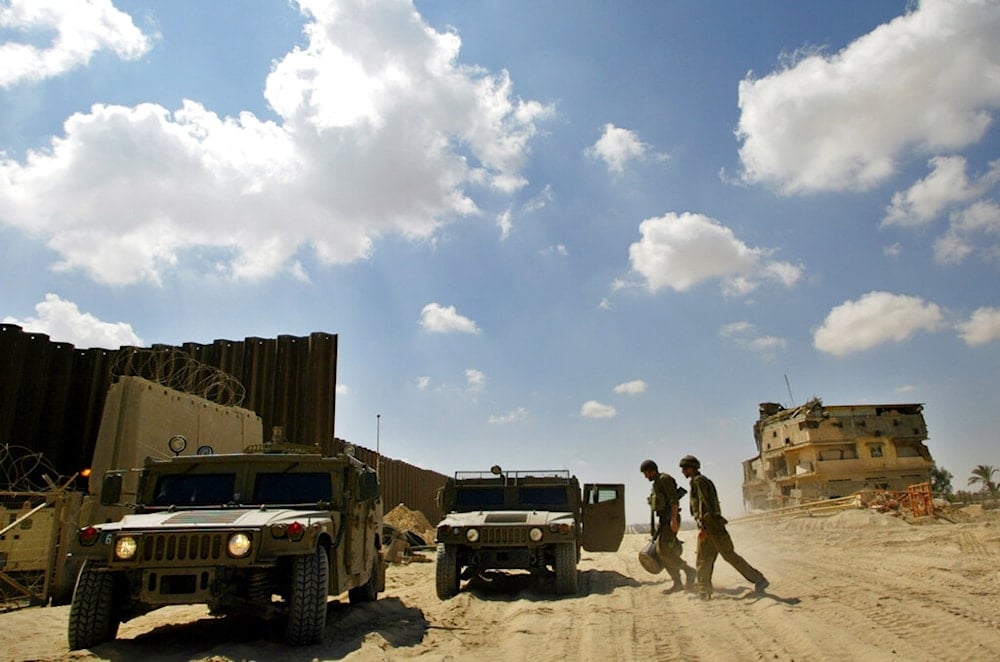Ex-IOF general refutes 'outright lies' about Philadelphi Corridor
The former Israeli military Ombudsman says Netanyahu is keeping Israeli forces in the Philadelphi Corridor in Rafah to prevent the conclusion of a ceasefire and prisoner exchange deal.
-

Israeli soldiers cross the Philadelphi Corridor on their way to a nearby Israeli military outpost in the southern Gaza Strip, near the Egyptian border, Sunday, Aug.15, 2004. (AP)
The Philadelphi Corridor in Rafah has become a major obstacle in reaching a prisoner exchange deal, former Israeli military Ombudsman, Major General (Res.) Itzhak Brik, pointed out, warning that failure to secure the release of Israeli captives held in Gaza could lead to their deaths and trigger a regional war.
The Philadelphi Corridor is a region that extends from the Israeli-controlled Karem Abu Salem crossing, linking the Gaza Strip and the 1948 occupied Palestinian territories, to the southernmost point on the Gaza Strip's coast.
Also known as the Philadelphia Route, the 14 km narrow strip of land separates Palestine from Egypt and was established as a "buffer zone" between "Israel" and Egypt in a 1979 treaty. Before the Strip was liberated in 2005, the Corridor was under the control of Israeli occupation forces.
In an article published in the Israeli newspaper Maariv, Brik criticized Prime Minister Benjamin Netanyahu, Chief of Staff Herzi Halevi, and Security Minister Yoav Gallant, accusing them of "throwing dust" in the public's eyes regarding the necessity of maintaining a military presence in the Philadelphi Corridor despite the military's acknowledgment that staying there has no strategic value, as the transfer of weapons and ammunition from Sinai to Gaza continues uninterrupted.
Brik revealed that, just days before the Israeli military launched its incursion in Gaza, he met with Netanyahu face-to-face and asked whether the military was planning to dig a canal to block the tunnels, which are vital to Hamas for transporting weapons and supplies.
According to the Israeli reserve Major General, Netanyahu responded that such a move was "impossible for various reasons."
He added that by the end of the discussion, it was clear that Netanyahu understood that the Israeli military has no solution for the Philadelphi Corridor issue without blocking Hamas' tunnels beneath it and that positioning Israeli forces there is ultimately futile.
Brik emphasized that despite this understanding, Netanyahu continues to impose the non-negotiable condition of maintaining Israeli forces in the Philadelphi Corridor, even during recent talks in Doha, a stance that is preventing the conclusion of a prisoner exchange deal.
He also recalled Halevi’s statement, in which he said, "If they decide that we stay in Philadelphia, we will know how to stay there and stay strong. If they decide that we should monitor [the area] and carry out raids whenever we have an indication, we will know how to do it."
He indicated that if the Israeli Chief of Staff truly believed in the critical importance of holding the Philadelphi Corridor, he would have stated it decisively rather than giving a vague response.
Brik asserted that Halevi is aware that maintaining control over the Philadelphi Corridor is ultimately ineffective, arguing that the Israeli Chief of Staff is simply seeking to glorify his "achievements", none of which have met any of the war’s objectives -- undermining Hamas and retrieving all the captives.
In his article, Brik highlighted that Halevi’s insistence on holding onto the Philadelphi Corridor creates a misleading impression for political leaders regarding the corridor's importance. This, in turn, legitimizes Netanyahu and his circle to insist on staying in the corridor, which significantly hampers negotiations for an agreement in Doha.
In the same vein, Brik also touched on the Netzarim Corridor, underscoring that maintaining Israeli forces in both corridors is meaningless and does not solve the issue of Hamas' tunnels entirely.
'Outright lies'
In a related context, the former Israeli military Ombudsman mentioned that he spoke to commanders and field soldiers who served for several months in the Philadelphi Corridor, claiming that they told him there is no face-to-face combat with Hamas fighters.
He said that Hamas employs guerrilla warfare, planting explosives and booby-trapping houses that Israeli forces enter, pointing out that most Israeli casualties are a result of entering booby-trapped homes and anti-tank fire from Hamas fighters, who emerge from tunnel openings, fire, and then disappear back into the tunnels.
Brik added that the Israeli forces stationed in the Philadelphi Corridor do not have full control over the tunnels beneath them, citing accounts from soldiers who confirmed that dozens of tunnels, which the Israeli military spokesperson claimed were destroyed in Rafah, are mostly not cross-border tunnels toward Sinai but tunnels used by Hamas within Rafah itself.
"The tunnels that the Israeli military claims to have destroyed are merely the tip of the iceberg," he said.
Brik also dismissed the claims of the Chief of Staff and the military spokesperson regarding the nearly one thousand Hamas fighters killed in the Rafah battles, describing these statements as "outright lies".
He concluded by saying that Netanyahu, with this maneuver, is sabotaging the Doha talks and putting the lives of the Israeli captives and "Israel" at risk," stressing the need for the Chief of Staff, Security Minister, Shin Bet head, and Mossad director to refrain from cooperating with the prime minister's decisions.
Read more: US backs Israeli approach to Philadelphi Corridor: Israeli official

 5 Min Read
5 Min Read








